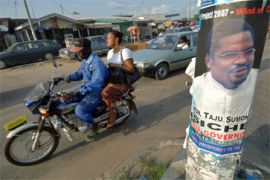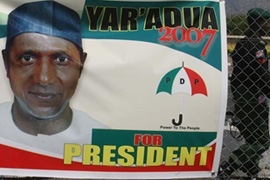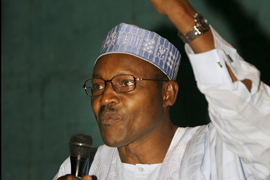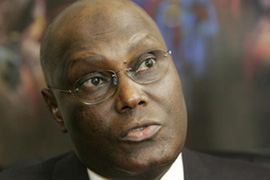Profiles: Presidential candidates
Profiles of the main contenders in Saturday’s elections in Nigeria.

Umaru Musa Yar’Adua
 |
| Umaru Yar’Adua is the ruling People’s Democratic Party candidate[AP] |
Umaru Musa Yar’Adua, representing the ruling People’s Democratic Party (PDP), is the governor of Katsina State.
The 56-year-old Muslim was a polytechnic teacher before he was elected governor in 1999. His late elder brother, General Shehu Musa Yar’Adua, was deputy to Olusegun Obasanjo, Nigeria‘s president, when Obasanjo was Nigeria‘s military ruler between 1976 and 1979.
Some have described Yar’Adua as a quiet man while others have called him a “puppet” whom Obasanjo has “anointed” to be the next president of Nigeria. He insists that he is his “own man”.
A trip to hospital in Germany last month has raised concerns over his health. Yar’Adua reportedly collapsed from exhaustion from campaigning on March 6. There are rumours he suffers from a kidney ailment and that his illness would allow Obasanjo to continue wielding power by proxy.
| External Link |
Most Nigerian commentators describe Yar’Adua as financially prudent and he is one of the few governors not investigated for corruption.
Yar’Adua’s critics accuse him of approving “inflated contracts to friends, relatives, and in-laws” and “directing illegal deductions” to local government councils.
He has pledged to continue with Obasanjo’s ongoing reform programme, focusing on good governance, anti-corruption drive and privatisation of state-owned enterprises. Critics of the PDP’s reform policy have said it lacks a “human face” and have called for the programme to be “dismantled”.
His running mate, Goodluck Jonathan, is the southern Christian governor from Niger Delta’s Bayelsa State. Many see his selection as a gesture to placate the people of the Niger Delta. He is also a softly spoken man and some critics claim the PDP’s choice of two reclusive candidates may hurt the party’s chances at the polls.
Muhammadu Buhari
 |
| Muhammadu Buhari is a former military ruler [AP] |
Muhammadu Buhari is a former military ruler of Nigeria. He ruled from January 1984 to August 1985, a period remembered for human rights abuses and a fight against corruption.
He won the ticket of the All Nigeria People’s Party (ANPP) after six nominees stepped down for him. He contested the 2003 presidential election, which he lost to Obasanjo. He has “vowed to resist a repeat of the massive rigging that characterised the 2003 election”.
Like his rival Yar’Adua, Buhari is from Katsina State. Although many Nigerians see him as disciplined and prudent, Christians view him with suspicion because of his strong Islamic views. He has vowed to abide by the constitutional provision on religion if voted to power. He has denied allegations that he has a “radical Islamist agenda” given his support for Islamic law in the north.
| External Link |
The constitution says no Nigerian has the right to impose his own religion on other Nigerians.
The ANPP opposed the current reforms of the Obasanjo administration and has described them as a “disaster”. Buhari’s manifesto, which is summed up in his book The Buhari Programme, promises national unity, poverty alleviation, restoration of security, rejuvenation of the education system, efficient management of the economy through fiscal and financial responsibility, expansion of primary health care services, and ensuring food security. He has also promised to “restructure the country into a true federalism for equitable distribution of resources and development of human capital”.
The media has criticised Buhari for introducing “harsh” anti-democratic laws, including a controversial gag order on the press in 1984, during his tenure as military head of state.
His running mate is Edwin Ume-Ezeoke, a former House of Representatives’ speaker and the current national chairman of ANPP. Ume-Ezeoke, an ethnic Igbo, worked to reconcile ANPP factions and was instrumental in making Buhari the party’s sole candidate.
Atiku Abubakar
 |
| Atiku Abubakar, Nigeria’s vice-president, is contesting on an Action Congress ticket [AP] |
Atiku Abubakar, Nigeria‘s vice-president, is from Adamawa State in north-eastern Nigeria. He was Obasanjo’s running mate in the past two presidential elections, but the ruling PDP suspended him from the 2007 primaries.
After the PDP expelled Abubakar from the party, Obasanjo declared the post of vice-president vacant. A Nigerian court ruled in favour of Abubakar, stressing that the president had no right to declare the vice-president’s post vacant.
Abubakar campaigned and successfully fought against a bill in the national assembly last year that would have granted Obasanjo a third term in office.
| External Link |
Abubakar’s Action Congress (AC) has pledged to “reform the reforms” of Obasanjo government. Abubakar pledged in a recent speech to give a “human face” to the PDP reform programme and explained that the PDP’s “much-hyped economic reform programme” has become a “weapon to inflict maximum anguish and suffering on the generality of Nigerians”.
Ben Obi, a Nigerian senator, replaced Chudi Nwike, as Abubakar’s running mate. Obi was one of the members of the anti-third term coalition that fought against Obasanjo’s attempt to extend his tenure.
Orji Uzor Kalu
Orji Kalu, 47, is the multi-millionaire governor of Abia State and has served two terms since 1999 under the ruling PDP. He was one of the vocal dissenting voices within the PDP for several months before breaking away to form the Progressive Peoples Alliance (PPA).
| External Link |
Prior to joining politics, Kalu was a successful international businessman with interests in banking, oil, telecommunications, import financing, insurance, publishing, real estate, shipping and manufacturing.
He has business offices in Ghana, Benin, Sierra-Leone, South Africa, Togo, South Korea, Singapore, United Kingdom, United States, Gambia, Liberia, Botswana and Cote d’Ivoire. Even though the Economic and Financial Crimes Commission accused Kalu of corruption, the Independent National Electoral Commission (INEC) cleared him to run in the 2007 presidential race.
Kalu’s running mate is Maryam Ibrahim Baba from Kano State.
Chukwuemeka Odumegwu Ojukwu
Chukwuemeka Odumegwu Ojukwu, the candidate for the All Progressives Grand Alliance (APGA), led the failed Biafra secessionist movement in 1967, which waged a three-year civil war in Nigeria.
Ojukwu has sought to reverse the marginalisation of the Igbo people and produce an Igbo president.
Many Igbo people see him as an emancipator, but new, well-funded Igbo-oriented political groups like Orji Kalu’s Progressive People’s Alliance (PPA) and the existence of strong factions within APGA have diminished his power-base.
Ojukwu’s running mate is Ibrahim Gajo.
Patrick Utomi
Patrick Utomi, a 50-year-old professor from the Igbo ethnic group, is standing on the ticket of the African Democratic Congress (ADC). Supporters call him an “ideas” man who made his name in academia and political commentary.
| External Link |
He hosted the popular television discussion programme Patito’s Gang, and taught at the Lagos Business School. He is also the vice-president of Nigeria‘s Platinum-Habib Bank.
Utomi has promised poverty eradication, massive job creation, food security, war against corruption, massive investment in education, and healthcare.
Yusuf Mustapha is Utomi’s running mate. He is the ADC’s chairman in Kaduna State.